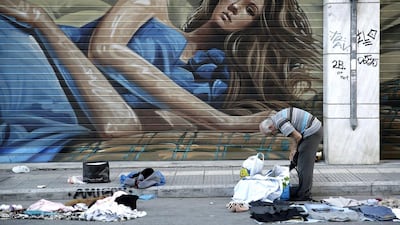“I am not begging, I am selling” said the girl, barely 10 years old. She had asked me whether I wanted two small packs of paper handkerchiefs, and I had given her €2 (Dh8) and the packs back. She was one of the many people who had paraded in front of me in a short time as I sat in an outdoor coffee house overlooking the Greek parliament in downtown Athens, just before the recent change in government in January.
Unlike the others, she was neither blind nor visibly disabled, nor an elderly person living on the charity of bypassers, unclean, or dressed in rags, or a needy refugee who could barely mutter some broken words in Greek. Her polite voice, penetrating eyes, groomed ponytail, straight posture, nice dress, polished shoes and respectful approach made her no different than my daughter of the same age. I never found out who she was. I assume she was coming from a family that was trying to make end meets in the most dignified way it could find, five years after Greece had uncritically introduced the harshest austerity programme in modern history that has given it the Olympic record of the longest and deepest recession in recent memory.
Unlike the global financial crisis in 2008 and the subsequent crises in Iceland, Ireland and Spain that had their origins in the unpredictable results of malfunctioning markets (financial, banking, real estate and so on), the Greek crisis was the predictable result of the reckless spending (and corruption) of profligate governments. When democracy was restored in 1974, government debt to GDP was 18 per cent. By 2009 a two-party political system (Conservatives versus Socialists) had brought the debt to 130 per cent, far beyond the conventional benchmark of 80 per cent that is considered (barely) serviceable in modern economies.
In plain English, Greek governments had borrowed too much and bankrupted the state. But borrowing cannot increase unless someone is prepared to lend more. Those who had lent to Greece were mainly private investors – consisting primarily of French and German banks that had enjoyed high returns after presuming there would not be a sovereign default in the euro zone.
The risk of a Greek government bankruptcy endangered the financial system of Europe in 2009 when its debt reached €299 billion (nearly half a trillion dollars at the exchange rate at the time). Greece had become “too big to fail”. A solution had to be found and the one adopted by the then government was not for insolvent Greece to default but, on the pretext that it is illiquid ie unable to meet just its short-term obligations, to be given money to pay back its lenders.
The IMF, the European Central Bank and the European Commission obliged by providing a combination loans, “haircuts” (participation of the private sector in the writedowns of sovereign debt) and forgiveness. This type of rescue is euphemistically called “debt socialisation” as those who would eventually pay the current and future bills is the society, that is, the ordinary taxpayers including those yet to be born.
The euro was rescued. But Greece was subjected to the most botched structural adjustment programme since the 1980s. It resulted in a reduction in disposable incomes by nearly 40 per cent and an increase in youth unemployment to more than 65 per cent. Paradoxically, public debt has increased to €320 billion (from €299bn in 2009) despite the fact that Greece received directly and indirectly €350bn – an impossibility for a mathematician but reality in economics when closing the gap between revenues and expenditures ignores the adverse effect of cutbacks on economic growth.
Three Nobel laureates, Paul Krugman, Joseph Stiglitz and Chris Pissarides, have argued from the beginning against the ill-founded Greek adjustment programme and that the euro zone needs to address for good the incoherence created between its common monetary policy and the independent fiscal policies pursued by each of its member states.
To these three economists, Myron Scholes added that further austerity is not the solution to the Greek crisis (The National, May 9). Mr Scholes is a brilliant theorist who was awarded the Nobel Prize in 1997 for his work on options and derivatives pricing. He also knows first-hand the short-term vulgarities of markets. True to his beliefs and applying his brilliant model, he had founded a hedge fund that fetched spectacular returns. The fund dramatically collapsed in 1998.
“The only way in generations and centuries past you got out of these debt problems is to default, restructure or inflate,” Mr Scholes said. Inflation through currency depreciation is not an option as Greece uses the euro. Greece has a small export base and restructuring takes years to show its effects.
The future has one solution for Greece: default in whatever way (from extending the repayment period of the debt and reducing the interest rate to debt reduction/ partial forgiveness) and then start again. Less known is the future of the little girl who, as many others, may turn into a professional beggar. For now, I still have the two packs of paper handkerchiefs she gave me.
Professor Zafiris Tzannatos is a strategy and policy adviser to international organisations and regional governments, and former chairman of the economics department, American University of Beirut.
Follow The National's Business section on Twitter

